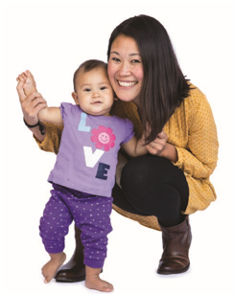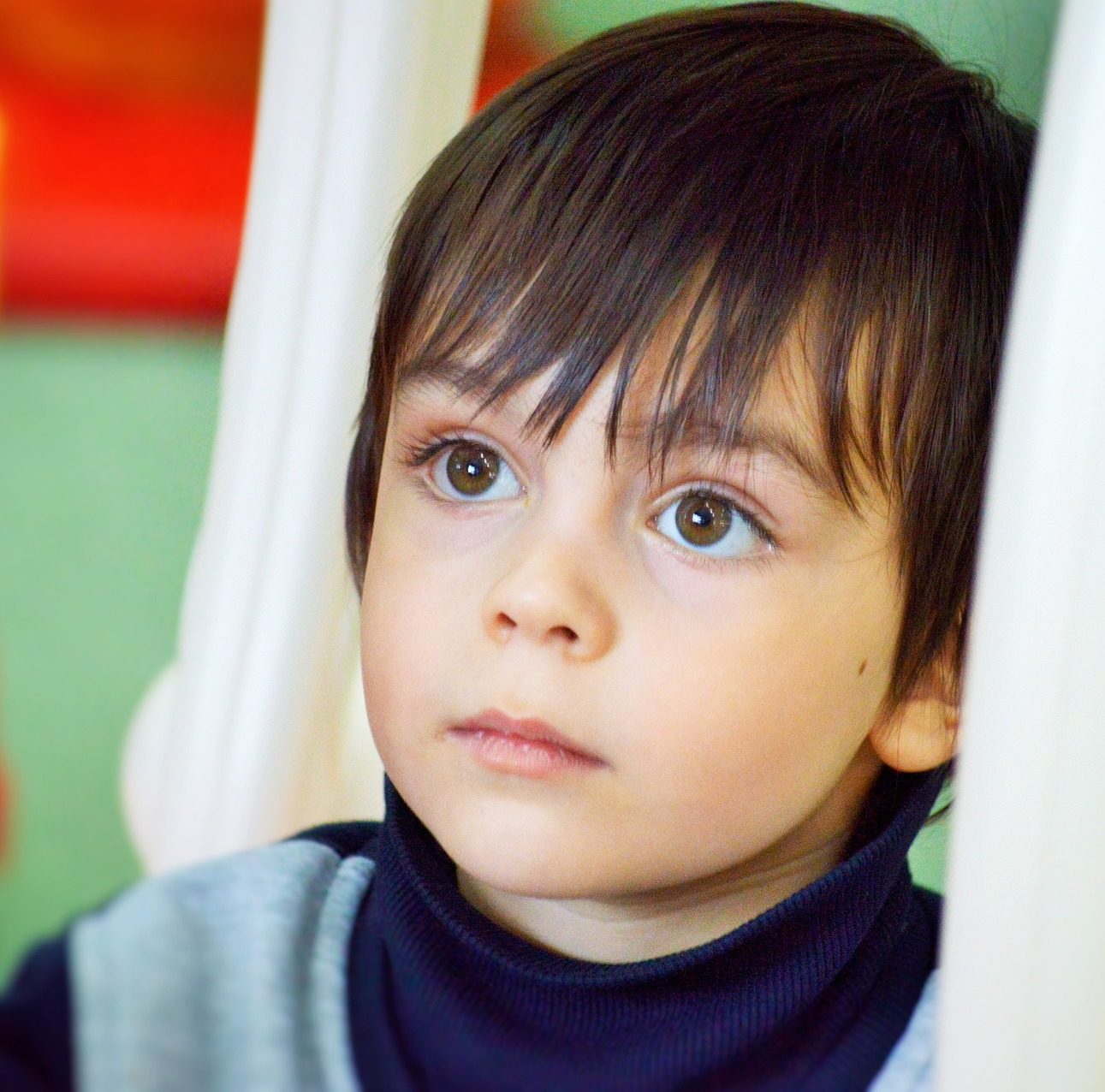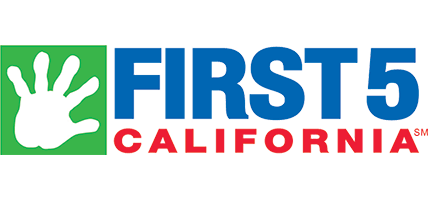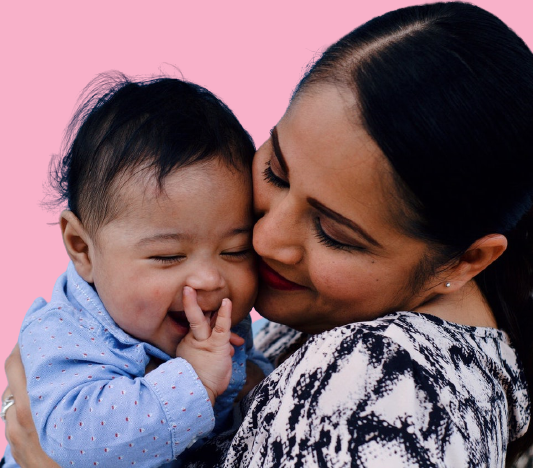 At each age in a child’s life, there are predictable levels of skill to expect. We have outlined the developmental milestones for ages 1 to 18—a checklist you can use as you observe your child growing up, and a guide to use with your pediatrician or your child’s teacher.
At each age in a child’s life, there are predictable levels of skill to expect. We have outlined the developmental milestones for ages 1 to 18—a checklist you can use as you observe your child growing up, and a guide to use with your pediatrician or your child’s teacher.
Parenting is a huge undertaking and each child is unique. Having as much information as possible helps. We hope this information will help you on your journey.
Download a PDF of As we grow…Key Developmental Milestones Ages 1-18.
1 Year
Movement
- Gets to sitting position without assistance
- Crawls forward on belly by pulling with arms and pushing with legs
- Walks holding on to furniture
- May walk two or three steps without support
- Uses pincer grasp (brings thumb and forefinger together)
- Bangs objects together
- Puts objects in and takes objects out of container
- Tries to imitate scribbling
- Loves to drop things so you can pick them up!
- Language & Communication
- Responds to simple verbal requests (e.g., “Come here.” “Bathtime!”)
- Uses simple gestures, such as shaking head for “no”
- Says “dada” and “mama”
- Uses exclamations, such as “oh-oh!”
Cognition
- Explores objects in many different ways (shaking, banging, throwing, dropping)
- Finds hidden objects easily
- Looks at correct picture when the image is named
Social Emotional
- Cries when mother or father leaves
- Tests parental responses to his actions during feedings (What do you do when he refuses a food?)
- Tests parental responses to his behavior (What do you do if he cries after you leave the room?)
- Repeats sounds or gestures for attention
Developmental Concerns
Everyone develops at different rates but talk to your health care professional if your child demonstrates any of the following as the first birthday approaches:
- Is not saying any words
- Does not make sustained eye contact
- Does not crawl
- Cannot stand when supported
- Does not search for objects that are hidden while he watches
- Says no single words (“mama” or “dada”)
- Does not learn to use gestures, such as waving or shaking head
- Does not point to objects or pictures
2 Years
Movement
- Walks alone
- Pulls toys behind her while walking
- Begins to run
- Kicks a ball
- Walks up and down stairs holding on to support
- Scribbles spontaneously
- Builds tower of four blocks or more
Language & Communication
- Points to object or picture when it’s named for him
- Recognizes names of familiar people, objects, and body parts
- Says several single words (by 15 to 18 months)
- Uses simple phrases (by 18 to 24 months)
- Uses two- to four-word sentences
Cognition
- Finds objects even when hidden under two or three covers
- Begins to sort by shapes and colors
- Begins make-believe play
Social Emotional
- Imitates behavior of others, especially adults and older children
- Increasingly enthusiastic about company of other children
- Demonstrates increasing independence
- Begins to show defiant behavior
Developmental Concerns
Everyone develops at different rates but talk to your health care professional if your child demonstrates any of the following as 18 to 24 months approach:
- Cannot walk by 18 months
- Does not speak at least 15 words by 18 months
- Does not use two-word sentences by age two
- Does not seem to know the function of common household objects (brush, fork, spoon) by 15 months
- Does not imitate actions or words by 24 months
3 Years
Movement
- Climbs well
- Runs easily
- Pedals a tricycle
- Walks up and down stairs, one foot on each step
- Screws and unscrews jar lids or turns door handle
- Copies a circle with pencil or crayon
Language & Communication
- Follows instructions with two or three steps
- Can name most familiar things
- Understands words like “in,” “on,” and “under”
- Says first name, age, and sex
- Talks well enough for strangers to understand most of the time
- Carries on a conversation using two to three sentences
Cognition
- Can work toys with buttons, levers, and moving parts
- Plays make-believe with dolls, animals, and people
- Does puzzles with three or four pieces
- Understands what “two” means
Social Emotional
- Shows affection for friends without prompting
- Shows concern for crying friend
- Understands the idea of “mine” and “his” or “hers”
- Shows a wide range of emotions
Developmental Concerns
Everyone develops at different rates but talk to your health care professional if your child demonstrates any of the following as the next birthday approaches:
- Falls down a lot or has trouble with stairs
- Has very unclear speech
- Does not speak in sentences
- Cannot work simple toys
- Does not play pretend or make-believe
- Loses skills he once had
4 Years
Movement
- Hops and stands on one foot up to five seconds
- Throws ball overhand
- Catches bounced ball most of the time
- Uses scissors
- Draws circles and squares
Language & Communication
- Has mastered some basic rules of grammar
- Speaks in sentences of five to six words
- Tells stories
Cognition
- Correctly names some colors
- Understands the concept of counting and may recognize a few numbers
- Begins to have a clearer sense of time
- Understands the concept of “same” and “different”
Social Emotional
- Interested in new experiences
- Pretends to be “Mom” or “Dad”
- Increasingly inventive in fantasy play
- Negotiates solutions to conflicts
- Imagines that many unfamiliar images may be “monsters”
- Views self as a whole person involving body, mind, and feelings
Developmental Concerns
Everyone develops at different rates but talk to your health care professional if your child demonstrates any of the following as the next birthday approaches:
- Cannot throw a ball overhand
- Cannot jump in place
- Cannot grasp a crayon between thumb and fingers
- Shows no interest in other children or interactive games
- Does not engage in fantasy play
- Lashes out without any self-control when angry or upset
- Does not use “me” and “you” appropriately
5 Years
Movement
- Stands on one foot for ten seconds or longer
- Hops, somersaults
- Swings and climbs on playground equipment
- Copies a triangle and other geometric patterns
- Prints some letters
- Dresses and undresses without assistance
Language & Communication
- Recalls part of a story
- Uses future tense
- Tells longer stories
- Says name and address
Cognition
- Can count ten or more objects
- Correctly names at least four colors
- Can name everyday household items
Social Emotional
- Wants to please friends
- Wants to be like her friends
- Likes to sing, dance, and act
- Able to distinguish fantasy from reality
Developmental Concerns
Everyone develops at different rates but talk to your health care professional if your child demonstrates any of the following as the next birthday approaches:
- Unusually fearful, aggressive, shy or sad
- Unusually withdrawn and not active
- Distracted after five minutes
- Cannot tell what’s real and what’s make-believe
- Does not play a variety of games and activities
- Does not use plurals or past tense properly
- Does not talk about daily activities or experiences
- Does not draw pictures
6-11 Years: Elementary School Age
Movement
- Learns to print letters and numbers, and then words
- By seven years, keeps printing neatly within the lines
- Draws pictures that are recognizable
- Develops ball skills with smaller ball
- Rides a two-wheel bike
- Jumps rope, skips and chases
- Dresses and grooms self completely
- Can use tools (i.e., hammer, screwdriver)
Language & Communication
- Tells and retells stories and events in a logical order
- Expresses ideas with a variety of complete sentences
- Starts and stays on topic and takes turns in conversation
- Gives directions
- Participates in group discussions
- Uses subject area information and vocabulary (e.g., social studies) for learning
Cognition
- Can tell time
- Reads more and enjoys reading
- Understands fractions
- Understands concept of space
- Can name months and days of week, in order
- Writes stories
- Starts school and homework habits now
- Begins to see the point of view of others more clearly
- Has an increased attention span
Social Emotional
- Cooperates and shares but can be jealous of others and siblings
- Likes competition and games
- Enjoys clubs and groups, such as Boy Scouts or Girl Scouts
- Starts to form stronger, more complex friendships and peer relationships. It becomes more emotionally important to have friends, especially of the same gender
- Starts to think about the future
- Experiences more peer pressure
- Is more aware of his or her body as puberty approaches
- Measures his performance against others
Developmental Concerns
Everyone develops at different rates but talk to your health care professional if your child demonstrates any of the following, if a teacher talks with you, if your child expresses concern or if you do not see improvements:
- Has poor motor coordination
- Has poor pronunciation, uses incomplete sentences
- Experiences an inability to concentrate
- Cannot play cooperatively
- Demonstrates little imaginative and fantasy play
- Demonstrates poor social/academic adjustment in school: preoccupied, easily frustrated, emotional outbursts, difficulty concentrating, can be overly reliant on teachers
- Experiences academic challenges: difficulties in reading or understanding math, memory issues, difficulty writing thoughts on paper
- Has poor impulse control, inadequate coping skills, anxiety, easily frustrated, may feel out of control
- Acts out frustration, anger, or anxiety with hitting, fighting, lying, stealing, breaking objects, verbal outbursts, swearing
- Has extreme reactions to perceived danger (i.e., “fight, flight, freeze” response)
- Is mistrustful of adults, or overly solicitous, manipulative
- Has difficulties in peer relationships, feels inadequate around peers, is over-controlling
12-18 Years: Middle School & High School Age
Movement
- Uses physical activities to develop gross and fine motor skills
- Skills are more integrated and smooth
Language & Communication
- Uses complex sentences
- Understands complicated instructions
- Uses humor and can be sarcastic or witty
- Uses slang and may speak differently to adults and peers
- Uses texting as a strong form of peer to peer communication
- Enjoys telling long stories
Cognition
- Is better able to express feelings through talking
- Shows more concern about future school and work plans
- Is better able to give reasons for their own choices, including about what is right or wrong
- Thinks hypothetically: calculates consequences of thoughts and actions without experiencing them, considers a number of possibilities and plans behavior accordingly
- Thinks about thought: leads to introspection and self-analysis
- Shows insight and perspective taking: understands and considers others’ perspectives, and perspectives of social systems
- Uses systematic problem-solving: can attack a problem, consider multiple solutions, plan a course of action
Social Emotional
- Shows more concern about body image, looks, and clothes
- Focuses on themselves, going back and forth between high expectations and lack of confidence
- Shows more interest in and influence by peer group
- Feels stress from more challenging schoolwork
- Spends less time with parents and more time with friends
- Has an increasing ability to control emotions
- Shows an increased tolerance for frustration
Developmental Concerns
Everyone develops at different rates but talk to your health care professional if your child demonstrates any of the following, if a teacher talks with you, if your child expresses concern or if you do not see improvements:
- Has social immaturity: is unable to share or negotiate with peers, overly bossy, aggressive, competitive
- Lacks impulse control, needs immediate gratification
- Has exaggerated responses (tantrums, aggression) to even mild stressors
- Has poor self-esteem or low confidence
- Acts out frustration, anger, or anxiety with hitting, fighting, lying, stealing, breaking objects, verbal outbursts, swearing
- Has difficulties in peer relationships, feels inadequate around peers, is over-controlling
- Is unable to initiate, participate in, or complete activities, gives up quickly
- Experiences academic challenges: difficulties in reading or understanding math, memory issues, difficulty writing thoughts on paper
- Develops eating problems
Are you concerned about your child or teen? To schedule an evaluation or to get advice about your child’s challenges, call or email a CHC Care Manager at 650.688.3625 or careteam@stage.chconline.org






